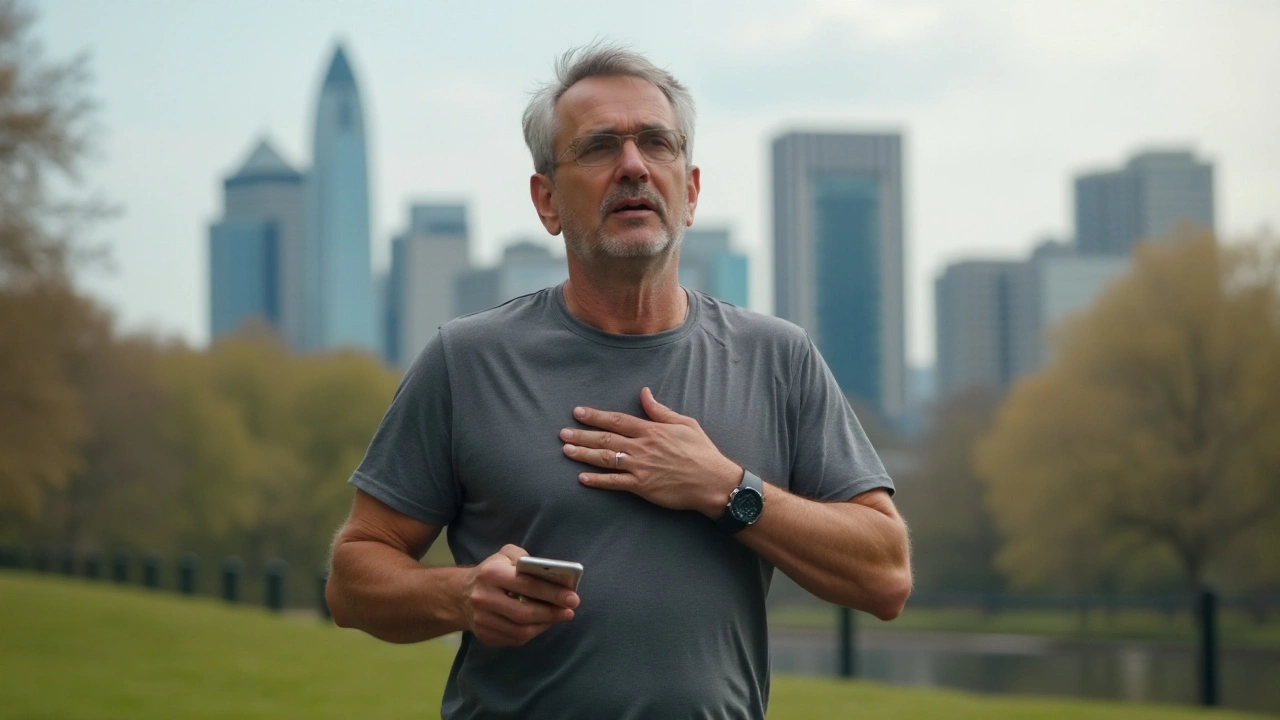Health anxiety is a silent battle for many, a relentless cycle of fears and worries that can overshadow everyday experiences. Often misunderstood and under-discussed, it is more common than one might think, affecting people from all walks of life. For someone living with this form of anxiety, even the smallest bodily sensation can spiral into an intense fear of serious illness.
In this article, we'll explore the depths of health anxiety through the lens of those who live with it daily. Their stories shed light on the challenges they face and the resilience they muster to navigate their lives. Alongside these narratives, we'll share insights from experts who specialize in mental health, offering practical strategies and advice to help manage such anxieties.
By piecing together real stories with professional insights, this piece aims not only to inform but also to connect readers with a community that understands their journey. For those who feel alone in their struggle, it is my hope that these stories will spark a sense of belonging and empowerment.
- What is Health Anxiety?
- Personal Stories: Living in the Shadow of Fear
- The Science Behind Health Anxiety
- Coping Mechanisms: Strategies for Managing Anxiety
- Expert Tips: Professional Insights and Advice
- Finding Support: Community and Resources
What is Health Anxiety?
Health anxiety, also known in clinical terms as hypochondriasis or illness anxiety disorder, is a nuanced form of anxiety that centers around the fear of having or acquiring a serious illness. People dealing with this condition often find that their day-to-day lives are dominated by constant worry and hyper-vigilance regarding their health. Unlike general anxiety, health anxiety manifests through a persistent preoccupation with bodily sensations, whether they are a normal heart palpitation or a slight headache. These sensations, though common and often benign, are interpreted catastrophically, leading the individual to seek reassurance more frequently than necessary by visiting doctors or undergoing unnecessary tests.
Health anxiety is pervasive, affecting approximately 1-5% of the general population and up to 12% in primary care settings, according to a study published in the Journal of the American Medical Association. It can begin at any age but tends to surface in adulthood. This condition is often exacerbated by societal factors, such as today’s digital era, where a wealth of health information (and misinformation) is easily accessible. The tendency to self-diagnose based on internet searches can amplify health fears, creating a vortex of anxiety that's challenging to escape.
"Health anxiety is often driven by misinterpretations of bodily sensations and the tendency to catastrophize," says Dr. Helen Tyrer, a leading researcher in cognitive behavioural treatments for health anxiety.Understanding that these sensations are not indicative of life-threatening diseases is the first step towards managing them. Cognitive Behavioral Therapy (CBT) is a frequently recommended treatment for health anxiety, designed to adjust the thought patterns that underlie this fearful mindset. CBT seeks to equip individuals with the capability to challenge their fears and manage triggers without resorting to excessive reassurance-seeking behaviors.
To visualize the impact of health anxiety on individuals, think of it as a loop or cycle that continuously feeds itself. First, there is a triggering event—perhaps a story about an illness or a minor symptom. This is followed by heightened vigilance and online research, where every piece of new information adds fuel to the fire. Then, there is reassurance-seeking, which might temporarily ease the fear, but soon the cycle resumes, often becoming more entrenched. Breaking this cycle requires interventions that address both the psychological and behavioral aspects of the condition, allowing individuals to reclaim their peace of mind.
Personal Stories: Living in the Shadow of Fear
Imagine waking up each morning with a sense of unease, a background noise of anxiety that accompanies you throughout the day. This is the reality for many who live with health anxiety. Take, for instance, Claire, a vibrant young woman who has been dealing with this condition since her early twenties. Claire describes her anxiety as a "shadow that looms over," turning every sneeze or ache into a potential health crisis. Despite numerous assurances from her physicians about her well-being, she finds herself fixated on the worst possible scenarios, a hallmark of health anxiety. Claire's story is not unique; many share her experience, trapped in a cycle of worry and reassurance-seeking that can feel never-ending.
Another compelling story is that of James, a middle-aged accountant who, after a bout of flu, started experiencing anxiety attacks. These episodes were triggered by what he perceived as chest pains, leading him to frequently visit emergency rooms. Despite tests that showed his heart was perfectly healthy, his mental health suffered immensely. James recalls the first time he realized this was more than just normal worry when he spent his nights on several medical forums, diagnosing himself with a myriad of ailments. This constant state of fear not only affected his personal life but also his career, as he often found it challenging to focus on tasks without the dread of health looming large.
Voices of Experience
Mary, a retired school teacher, reflects on her long battle with health anxiety as she sips tea in her Vancouver home. Her journey began after she misread a benign test result, which spiraled into a decade of distrust in medical advice. She shares, "It’s exhausting, the endless loop of checking, Googling symptoms, and then more tests." Thanks to a supportive therapist, Mary has learned to harness breathing exercises and mindfulness to bring her back to a place of calm. Such practices, she believes, have been crucial in regaining her life. Mary's experiences highlight the importance of professional help and proven coping mechanisms in managing anxiety effectively.
These narratives underline a common thread — the challenge of living with an invisible illness, which often leads to social isolation. Families and friends might not understand the depth of the turmoil faced by their loved ones who deal with health anxiety. Yet, amidst these struggles, there is hope. Many found solace in community groups where individuals shared their stories and learned from each other's experiences. Such platforms offer reassurance that no one has to battle their fears alone.
"Listening to the stories of others living with health anxiety made me realize I wasn't losing my mind — I was living in my own mind too much," shares Rosa, a member of an online support group.
Breaking the Cycle
While every person's experience with health anxiety is different, the stories of Claire, James, and Mary reveal common themes that resonate deeply. Often, the key to navigating this challenging condition lies in recognizing one's unique triggers and patterns. Simple lifestyle changes, like practicing mindfulness, engaging in regular physical exercise, and limiting time spent online researching symptoms, can be effective tools in breaking the cycle of fear. It's critical for individuals with health anxiety to seek out therapists who are well-versed in cognitive behavioral therapy (CBT), a method proven to help reframe negative thought patterns.
Through these personal stories, it's apparent that understanding health anxiety requires not just medical awareness but also empathy and support. By tuning into the experiences of those who have walked the path of anxiety, we can foster a more inclusive environment that encourages open discussions and shared healing. Every journey, as fraught with fear as it might be, brings with it lessons that can transform anxiety into resilience.

The Science Behind Health Anxiety
Health anxiety, also known as hypochondriasis, has deep roots in the intricate workings of the human mind, influenced by a complex interplay of psychological, environmental, and biological factors. On a cognitive level, individuals with health anxiety frequently misinterpret benign bodily sensations as signs of severe illness. This misinterpretation is often perpetuated by a hyper-vigilance to physical sensations, coupled with a tendency for catastrophic thinking, where worst-case health scenarios dominate the mind.
Research suggests that a history of health-related trauma or childhood illness can leave an indelible mark on how one perceives bodily symptoms. The brain, in an effort to protect, might overreact to minor deviations from the norm, seeing threats where there are none. The prefrontal cortex, responsible for logical reasoning, and the amygdala, the brain’s fear center, play crucial roles in this heightened response. During moments of anxiety, the brain's alarm system can overpower rational thought, leading individuals to seek medical reassurance repeatedly, a behavior that psychologists term as "safety-seeking behavior."
There's also a significant influence from genetic predisposition. Studies indicate that health anxiety can run in families, suggesting a hereditary link. Neurotransmitter imbalances, particularly involving serotonin and dopamine, can amplify anxiety responses, effectively turning a whisper of doubt into a roar of concern. Environmental factors like stress, lifestyle, and even upbringing can exacerbate these inherent tendencies, contributing to an overwhelming fixation on health.
Cognitive behavioral therapy (CBT) has been recognized as one of the most effective treatments for health anxiety. According to the Anxiety and Depression Association of America (ADAA), CBT aims to shift the fearful thoughts and replace them with more realistic conclusions, aiding patients in finding relief from chronic worry.
Moreover, the rise of digital health information, albeit useful, sometimes fuels health anxiety. The internet provides an abundance of medical information, which, although beneficial, can also lead to self-diagnosis, an all-too-common trap. Terms like "cyberchondria" have emerged, describing the spiral of anxiety triggered by online health research. With every search potentially leading to a new self-imposed diagnosis, individuals can find themselves in a loop of persistent health concerns.
Understanding these scientific underpinnings offers hope. It opens doors to various therapeutic approaches and coping strategies tailored to dismantle the skewed perceptions that fuel the anxiety. As we unravel the complexities of health anxiety, it becomes evident that this condition is not merely a matter of worrying too much. It is a profound distortion in perception, grounded in neural pathways that, once understood, can be gently rewired to alleviate distress.
Coping Mechanisms: Strategies for Managing Anxiety
Finding effective ways to manage health anxiety involves a combination of self-awareness, practical strategies, and sometimes, professional guidance. Recognizing that dealing with mental health isn't a one-size-fits-all situation is the first step. It requires patience and a willingness to experiment with different approaches until you find what suits your unique needs. Whether it's through mindfulness techniques or structured routines, having a set of practical tools can significantly alleviate the burden of anxiety and pave the way for a more peaceful day-to-day experience.
One of the most recommended techniques by mental health professionals is mindfulness meditation. By focusing on the present, the practice gently encourages individuals to disengage from the cycle of anxious thoughts. Studies have found that consistent mindfulness practice can reduce the symptoms of anxiety disorders by about 30%. To begin, set aside a few minutes each day in a quiet space. Close your eyes, take deep breaths, and focus on your breathing. Whenever intrusive thoughts creep in, acknowledge them without judgment and gently guide your focus back to your breath.
Another valuable approach is cognitive-behavioral therapy (CBT), which targets the thought patterns that fuel anxiety. CBT helps individuals identify and challenge distorted beliefs about health and their body. Working with a therapist, patients learn to replace these thoughts with more balanced and realistic ones. For those unable to access in-person therapy, online CBT programs have also shown effective outcomes, offering flexibility and access to valuable resources in the comfort of their homes.
Aside from professional avenues, lifestyle changes also play a crucial role in managing anxiety. Regular physical activity is known to reduce stress hormones and increase endorphins, the body's natural mood lifters. Engaging in exercise not only benefits your physical health but also bolsters mental resilience. Activities such as yoga, swimming, or even a simple walk in the park can make a substantial difference. Alongside exercise, maintaining a balanced diet and ensuring adequate sleep can profoundly impact your mental wellness.
Building a support network is another vital component. Sharing your experiences with trusted friends or family can ease the feelings of isolation often associated with health anxiety. Moreover, connecting with others who experience similar challenges, either through support groups or online communities, can be incredibly validating and reassuring. As one individual shared, "Knowing I wasn’t alone in my thoughts gave me the strength to seek help and strive for better days."
Finally, include regular relaxation techniques such as progressive muscle relaxation, where you systematically tense and relax different muscle groups, or engage in creative activities like art or music that offer a peaceful distraction to soothe your mind. Crafting a daily routine that integrates these varied elements will not only improve day-to-day life but will also fortify your ability to handle anxiety in the long run. Remember, while these coping mechanisms can provide significant relief, it’s crucial to be patient with yourself and reach out for professional help if needed.

Expert Tips: Professional Insights and Advice
Navigating the choppy waters of health anxiety can often feel isolating and bewildering, but understanding the strategies that experts recommend can forge a path to clarity and peace. Mental health professionals consistently emphasize that knowledge is an instrumental tool in managing anxiety. It is essential to recognize when your thoughts are being hijacked by unfounded health fears. Cognitive Behavioral Therapy (CBT) emerges as a potent ally, teaching individuals to reshape distorted thinking and replacing it with balanced perspectives.
Recognizing symptoms early is vital, but so is discerning between genuine health concerns and anxiety-driven worries. Mindfulness-based interventions are praised for their ability to anchor someone living with health anxiety in the present moment, challenging them to observe their thoughts without judgment. This practice fosters a gentle acceptance of their feelings, potentially reducing the grip that anxiety holds. Experts often highlight the importance of this mindful approach, not as a quick fix, but as a lifelong skill adaptable to numerous scenarios.
Another frequently mentioned component is lifestyle adjustment. Simple yet profound changes, such as regular exercise, which releases endorphins and boosts mood, and a balanced diet, can form a strong foundation for mental health. Sleep, too, should not be underestimated. Lack of rest can exacerbate anxiety, making it crucial to cultivate a soothing bedtime routine. Experts suggest creating a sleep schedule and limiting screen time before bed to enhance sleep quality.
For those seeking concrete steps, many professionals outline structured techniques to manage anxiety. Deep breathing exercises, for instance, help regulate the nervous system, providing immediate relief during stressful moments. Visualization techniques, on the other hand, empower individuals by mentally rehearsing scenarios in a safe space, which can lower anticipatory anxiety. Alongside these methods, keeping a journal can serve as an outlet to process emotions, track triggers, and see progress over time.
"Understanding your triggers is half the battle," says Dr. Lisa Feldman, a respected psychologist specializing in anxiety disorders. "Once you identify them, the path to healing becomes clearer, and you engage with your anxiety rather than feel overwhelmed by it."
It is crucial to chat openly with medical professionals about fears and anxieties. Often, health anxiety thrives in secrecy, fed by the assumption that one's concerns are irrational and best kept hidden. Yet, talking openly about these concerns can dismantle shame and bring about a supportive network of care. Many find solace in community groups, where shared experiences can validate personal struggles and illuminate new coping mechanisms.
Mental health experts stress that while health anxiety is a formidable opponent, it is not insurmountable. Armed with practical tips and professional advice, individuals can gradually reclaim control over their lives. The journey may be challenging, but each step forward, buoyed by knowledge and support, contributes to decreasing the hold that this anxiety may exert over one's well-being.
Finding Support: Community and Resources
The journey toward managing health anxiety is deeply personal, yet it's a path best walked with others who understand the struggles involved. Connecting with a community, whether online or in-person, can provide a comforting reminder that you're not alone. With technology bridging distances, accessing support has never been more convenient. Online communities offer platforms where individuals share experiences, advice, and encouragement. Websites like HealthUnlocked and Anxiety UK offer forums specifically for health anxiety, where members actively engage in discussions and support each other through shared experiences and understanding.
For many dealing with anxiety, the feeling of isolation can compound their symptoms. Engaging in group therapy sessions can help dissolve these feelings. These sessions offer a safe space to express fears without judgment, allowing participants to learn coping strategies from one another. According to the American Psychological Association, 'being part of a group with shared issues can lead to greater self-understanding and bring about substantial healing.' Many find that listening to others articulate similar struggles brings a form of solace and insight that individual therapy sometimes cannot provide.
"It’s immensely reassuring to find people who articulate the same fears you have," notes Dr. Claire Weekes, renowned for her work in mental health and anxiety disorders. "Understanding you're not alone provides strength and a sense of community."
Support from family and friends also plays an integral role. Many people with health anxiety hesitate to open up to loved ones, fearing stigmatization. It's important to remember that those who care about you can offer invaluable emotional support. Educating them about health anxiety can help in fostering empathy and understanding. Imagine a friend becoming a partner in your journey, someone who acknowledges your concerns, encourages healthy perspectives, and supports you in seeking professional help when needed.
To facilitate this process, you might consider involving your family in therapy sessions occasionally. Family therapy can work wonders in creating an atmosphere of understanding within your personal circles. Therapists can guide families in providing support tailored to the specific needs of someone experiencing health anxiety. This approach alleviates pressure and promotes a collaborative environment where everyone can work together effectively.
Resources at Your Fingertips: Exploring Online Options
In today's digital age, the Internet is a well of resources that can be tapped into at any time. Websites like Breathe, Calm, and Headspace provide excellent tools in managing anxiety. These platforms offer exercises in mindfulness, meditation, and breathwork, helping anchor you in the present moment and tone down the intensity of intrusive thoughts.
Moreover, social media can't be overlooked. While it can be a double-edged sword, following accounts that focus on mental health awareness can transform your social media experience into a positive and encouraging one. Influencers, mental health advocates, therapists, and organizations all share content that aims to inspire, educate, and reduce the stigma surrounding mental health issues.
Coping strategies with a focus on self-care should always be part of your toolkit. Regular exercise, maintaining a balanced diet, and ensuring adequate sleep form the foundation of a stable mental health routine. Combining these lifestyle habits with insights and shared experiences from communities can significantly aid in reducing the grasp of health anxiety. Ultimately, finding the right balance of community support, professional guidance, and self-help techniques is a vital step toward reclaiming control over one's health and peace of mind.






